How can you defend Europe without the Americans? With Donald Trump inciting Russia to “do whatever the hell they want” to NATO members not paying enough, it’s clear a Trump 2.0 could shatter the alliance. This isn’t news. Leaders of Germany, Europe’s biggest economy, have known this since Trump took office in 2017. They know what’s strategically necessary to fill the gap. The trouble is, this would be politically impossible for Berlin.
A Trump-led unraveling of NATO would confront Germany with a daunting to-do list
Compensating for the United States, which provides 70 percent of alliance defense spending, would be staggeringly costly for Germany. It would transform spending habits of the past half-century under which welfare spending was continually expanded to pacify society with a massive, no-risk social insurance policy.
“The ‘End of History’ was an American idea, but it was the Germans who lived the neo-Hegelian dream,” says Timothy Garton Ash. “The country in which the Berlin Wall had come down… nourished the greatest illusions of Europe’s post-Wall era.”
Yet without a leading political and military role for Germany, Carl von Clausewitz’s “center of gravity” — the thing that allows an army, institution, or country to keep going — won’t hold for either the European Union or the continent’s defense. “Germany cannot do any of these things on its own, but without Germany none of them will happen,” says Garton Ash.
Chancellor Olaf Scholz’s Zeitenwende, or historical turning point, of increased German defense spending — announced after Russia’s full invasion of Ukraine in 2022 — has a crucial feature: there’s no cutting of social welfare; on the contrary, it’s being increased. Debt is being run up to pay for the Bundeswehr. But the Zeitenwende’s €100 billion ($107 billion) for the military is peanuts compared to what’s needed after decades of underspending.
“We may have to fight a defensive war,” says General Carsten Breuer, Germany’s highest-ranking soldier. “We now see a Bundeswehr that is not yet adequately prepared for this.”
A Trump-led unraveling of NATO would confront Germany with a daunting to-do list. More missiles, more anti-missile systems, huge reserves of artillery shells and ammunition, an expanded air force with airlift and air-tanker capabilities, more tanks and armored vehicles, a navy that projects global strength, cyber warfare, swarms of drones and anti-drone systems and expanded intelligence services.
In addition, Germany needs to harden civilian infrastructure for 84 million people. Yet even normal German infrastructure, which is badly run down, is unaffordable. Take the city of Potsdam, population 190,000, once home of Prussian King Frederick the Great. Its backlog of street repairs is €300 million ($321 million), but its street repair budget for 2024 is €3.9 million ($4.2 million). Transpose this on the nation and the fiscal straitjacket misery is clear.
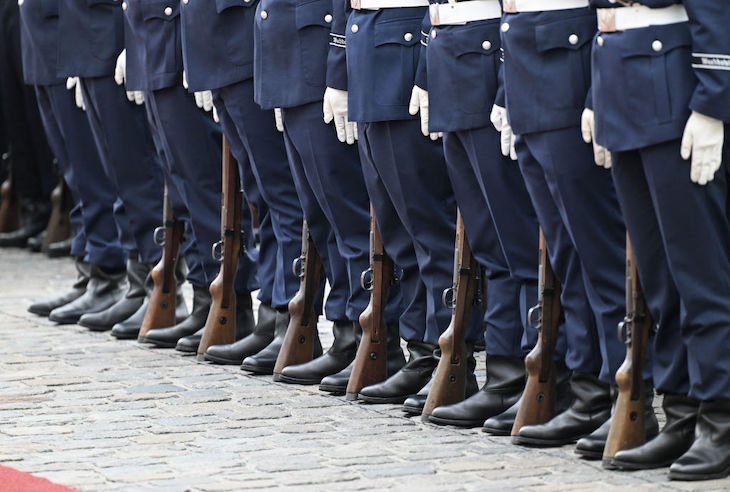
Debt-funding won’t work due to soaring costs of equipment and higher interest rates. Realizing this, Scholz’s government refused to make NATO’s 2 percent of GDP target for military spending legally binding. If German leaders were serious about defense they would justify cutting butter for guns by saying Germany faces an existential threat. Good luck with that in a society which is hardwired to believe there must never be budgetary consequences for welfare or subsidies.
Germany’s 2024 federal budget reflects what voters want: the ministry for labor and social affairs has the most money, €176 billion ($188 billion), followed in a distant second place by the ministry of defense with €52 billion ($56 billion). In a post-NATO world, these figures would almost need to be reversed.
The last German leader who invoked blood, sweat and tears to revamp welfare and labour laws was Social Democrat Gerhard Schröder with his Agenda 2010. Schröder’s laws may have saved Germany’s economy but they broke his political back and he was tossed out of office in 2005. His SPD never forgave him and has devoted itself since to unwinding the Agenda 2010. This is one reason why Germany is again the sick man of Europe.
Yet Schröder’s reforms were small change compared to what’s needed today. Germans also aren’t ready for serious rearmament because too many people still in power or in rising political parties backed the flawed Russia ties, have pacifist roots or are overtly pro-Kremlin.
Exhibit number one is Chancellor Scholz’s SPD, which is packed with people who pushed the pro-Russia line, including the Nord Stream natural gas pipelines running from Russia to Germany under the Baltic Sea. Egregious examples are federal president Frank-Walter Steinmeier who as Chancellor Schröder’s chief of staff and foreign minister under Angela Merkel was a key architect of Berlin’s pro-Kremlin policies. In 2016, after the start of Russia’s war on Ukraine, Steinmeier bizarrely criticized NATO exercises in Poland as “saber-rattling” and “war cries.”
Then there’s the SPD prime minister of Mecklenburg-West Pomerania, Manuela Schwesig, who strongly supported Nord Stream II. Schwesig now admits that “with today’s knowledge, the decision for Nord Stream 2…was wrong.”
A notable SPD exception is defense minister Boris Pistorius, who is one of the few party members to grasp the magnitude of Germany’s military challenges. While leading Greens like foreign minister Annalena Baerbock and Anton Hofreiter have taken a steely stand against Russia and back Ukraine, parts of the party base remain staunchly in its anti-militarist tradition.
The far-right Alternative for Germany (AfD) — the second strongest party in the June 9 EU parliament elections — is pro-Russia, anti-US, anti-EU and anti-NATO. The other big winner in Germany was the newly founded, pro-Russian BSW. The former East German communists, the Left (Die Linke) Party, are hopelessly pro-Russia and anti-Bundeswehr.
The opposition Christian Democratic bloc — which won the most votes in the European elections — backs stronger German defense spending. It’s doubtful, however, that given its powerful social welfare wing that it would make a big enough shift from handouts to tanks. And don’t forget: CDU chancellor Merkel presided over Berlin’s cozying-up-to-Russia policy which has been called Germany’s biggest foreign policy failure since 1945.
It will mean a big expansion of the Kremlin’s mafia methods across Europe
Time and demographics are further reasons Germany can’t cover for a Trump NATO exit. German military procurement moves at a glacial pace and there are backlogs of orders for critical systems such as missiles and anti-missile systems. Even if ordered, new equipment will take years or decades to become operational.
But Germany isn’t even ordering, says Frank Haun, CEO of KNDS which builds the Leopard II tank. ‘The vast majority of our orders in 2023 did not come from Germany, but from other NATO countries,” he told the Frankfurter Allgemeine.
German industry can produce about three tanks a month, according to a report in the Wall Street Journal citing German officials. German-French KNDS, which also builds the Caesar truck-mounted howitzer, did not reply to emails seeking confirmation of this figure. KNDS can currently produce four Caesar systems a month, Defense News said citing Philippe Petitcolin, chairman of the KNDS board of directors. West Germany alone had over 7,000 tanks and armored vehicles in the 1980s. Germany now has about 300 tanks. Compare this with the rate of materiel losses in the Ukraine war. “We can still defend Augsburg, but not Munich and Berlin,” warns Haun.
There are some signs that Germany is waking up. Der Spiegel reported this week that Pistorius plans to order 105 Leopard II tanks at a cost of €2.93 billion ($3.13 billion). They quote a confidential document prepared for the German parliament’s budget committee. The tanks are supposed to be delivered by 2030.
Germany has for years failed to hit the Bundeswehr manpower target of 203,000 soldiers amid skilled labor shortages. The armed forces continue to shrink and soldiers now number about 181,000. A call by Pistorius to resume conscription, suspended in 2011, was shot down by the leader of his own SPD.
If Europe’s wealthiest, biggest country cannot significantly rearm, what does this mean for the continent? Europe may fragment and the European Union will have a hard time maintaining even its status quo, let alone expanding or deepening ties. Moscow will use disinformation, the weaponization of migrants and gray-zone moves like the removal of buoys marking the Russian-Estonian water border to degrade and break down Europe.
As the American nuclear shield falls away, countries like Poland, Turkey and possibly Finland may decide to build nuclear weapons to provide protection against Russian nuclear blackmail. The idea that there can be shared nuclear deterrence for Europe is a fairy tale. Having joint European fingers on the trigger would mean immobilizing the trigger.
Some states, like Germany and Austria, may appease Russia. Berlin might revert to the Schröder-Merkel prioritizing ties with the Kremlin and cutting deals for German industry. This could be branded as a Bismarckian Mittelmacht (middle-sized power) redux, placing Germany between Russia and the rest of Europe, with Berlin politically equidistant from Moscow and Washington.
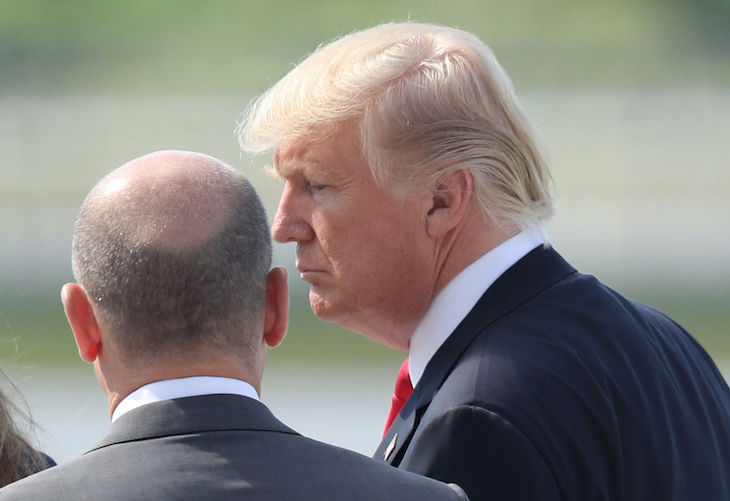
Some countries will be lost and become Kremlin satellites. Ukraine might be the first to go, followed by Georgia and Moldova. Other candidates include the Baltics (Is Paris or Berlin really worth Tallinn?), Cyprus, Malta and possibly Greece. The Balkans may become a violent, geopolitical playground with Serbia serving as Moscow’s bridgehead.
This could happen far faster than imagined. As Lenin noted: “There are decades where nothing happens; and there are weeks where decades happen.”
Vladimir Putin would seize the opportunity if Trump repudiates NATO’s collective defense of Article 5. Little has changed since Winston Churchill told Averell Harriman in 1946 that the Russians will try all the rooms in a house and enter those that are not locked.
Political vacuums will emerge and might be filled by a new regional power. Or they won’t be filled, leading to failed states as in Africa’s Sahel. Think of Europe with more and bigger Kosovos. Imagine if Trump is elected and tells Europe: “You’re on your own.” Then the Houthis ramp up attacks in the Red Sea, essentially closing the Suez Canal. Trump responds that the US doesn’t need to import Mideast oil or gas, so it’s not Washington’s problem. The Chinese navy moves in and says it will guarantee safety of passage. Germany is grateful and expresses thanks to Beijing. And then President Xi Jinping phones Chancellor Scholz and says, “Olaf, I have a favor to ask of you.”
When do we reach a point when Berlin has to call Beijing or Moscow first before Washington or Brussels? Meanwhile, President Putin, who defeated and divided Ukraine after Trump axed military aid, is looking for vengeance with policies aimed at tearing Europe apart.
With NATO a shell after the American exit, the Kremlin decides to force Russian nuclear-armed naval vessels into a European harbor. Putin demands his ships be allowed to dock at Antwerp’s port. The commander of the flagship then casually instructs the Belgian prime minister on how to vote in the EU.
Russia’s navy isn’t only active in Belgium. It also targets Europe’s weakest maritime link, non-NATO member Ireland. Putin saw in 2022 that Ireland’s armed forces are a joke and that its leaders have scant will to defend Ireland’s Exclusive Economic Zone. A Russian naval exercise 150 miles off the Irish coast was only moved after Irish fishermen vowed to keep fishing in the area.
“Ireland stands out as the worst-prepared European country to meet any meaningful threat — or even anything less than a meaningful threat,” says Eoin Drea, of the Wilfried Martens Centre for European Studies.
Three-quarters of all cables in the northern hemisphere — linking Europe and North America — pass through, or near, Irish territorial waters, carrying internet, financial and business transactions. With an unerring sense of geostrategic priorities, Dublin recognized Palestine as a state. At the same time, French, British and Norwegian submarine-hunting aircraft were flying off the west coast of Ireland searching for a suspected Russian submarine. Ireland had no military means to join the search.
The Kremlin will ramp up its promotion and funding of pro-Russian political parties, fellow travellers, tame journalists and other usefuls across Europe. Russia will become more aggressive in using its intelligence services-collected Kompromat to destroy or influence political figures in Europe.
Scholz doesn’t dare say how he plans to defend Europe without America
The hollowing out of NATO and loss of European sovereignty will mean a big expansion of the Kremlin’s mafia methods across Europe. These will impact the European economy. Threats could be made to a German CEO to get him to shift investment from, say, India to Russia along the lines of “We know your daughter studies at Oxford — it would be a shame if something happens to her.”
The loss of US-led collective defense for Europe and the American nuclear umbrella will alarm foreign investors. Would Elon Musk really have invested over €5.5 billion ($5.9 billion) in his Tesla plant near Berlin with no NATO? Tesla’s Gigafactory in Brandenburg is a seven-hour drive from the Russian exclave Kaliningrad.
To be sure, a possible brake on Trump exiting Europe is exactly the fact US businesses have massively invested in Europe since 1945. Money, as everyone knows, is among the few things that sharpens Trump’s senses and it might be a reason for him to keep US forces in Europe given that a US departure could trigger a collapse of the American stock market. But this is probably wishful thinking at odds with Trump’s smash-and-grab mentality.
Europe must face the stark reality that Germany’s social welfare entitlements have become inbred in the nation’s demos. This combined with the Third Reich’s poisoning of all things military and geostrategic will make meaningful rearmament almost impossible. Yet Germany is pivotal to a Europe facing what threatens to be a terrifying polar opposite of the twenty-five years of hope, freedom and prosperity following the 1989 opening of the Berlin Wall. Things must get worse, appallingly worse, to jolt German voters into accepting the massive welfare and subsidy cuts needed to pay for rearmament.
If massive rebuilding of the Bundeswehr doesn’t start now it will be too late. But Chancellor Scholz won’t do it. The hollowness of his “Zeitenwende” was shown in the European elections where he surreally campaigned for “peace” and “peace and security without war” amid Europe’s biggest war since 1945. His SPD was duly trounced, getting its worst ever result in a national election.
There is zero leadership from Scholz in explaining the terrible consequences for Germany of a Ukraine defeated by Russia. Scholz doesn’t dare say how he plans to defend Europe without America and there isn’t a hint of the social welfare cuts needed to fund the military. And this is Germany’s and Europe’s tragedy as the continent slides towards a Hobbesian dog-eat-dog world.
This article was originally published on The Spectator’s UK website.



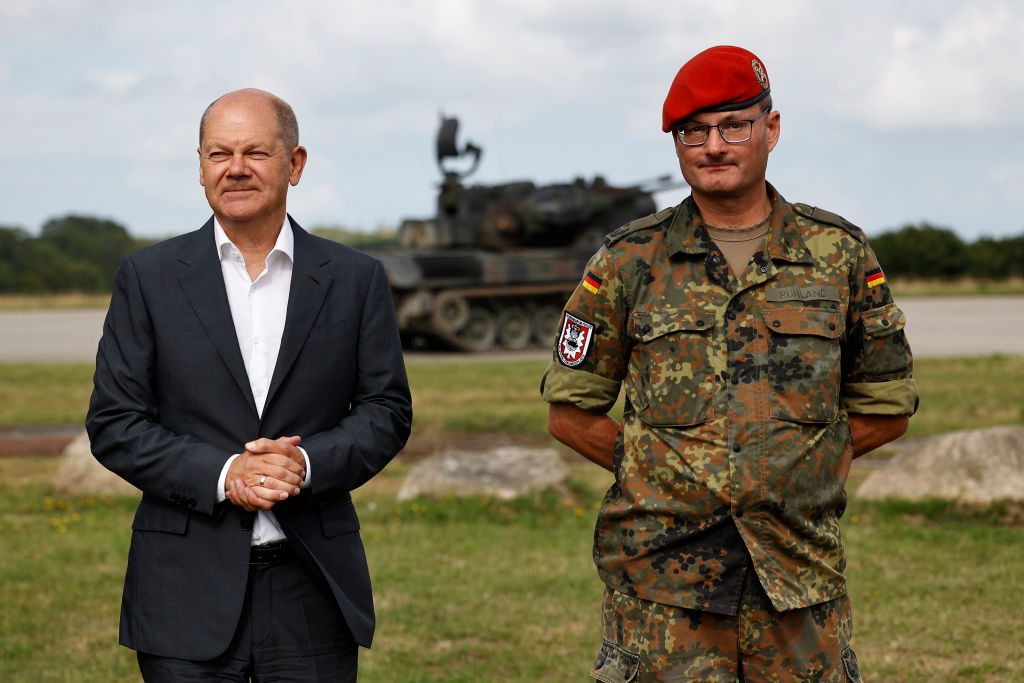






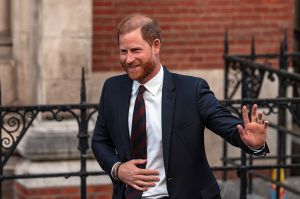






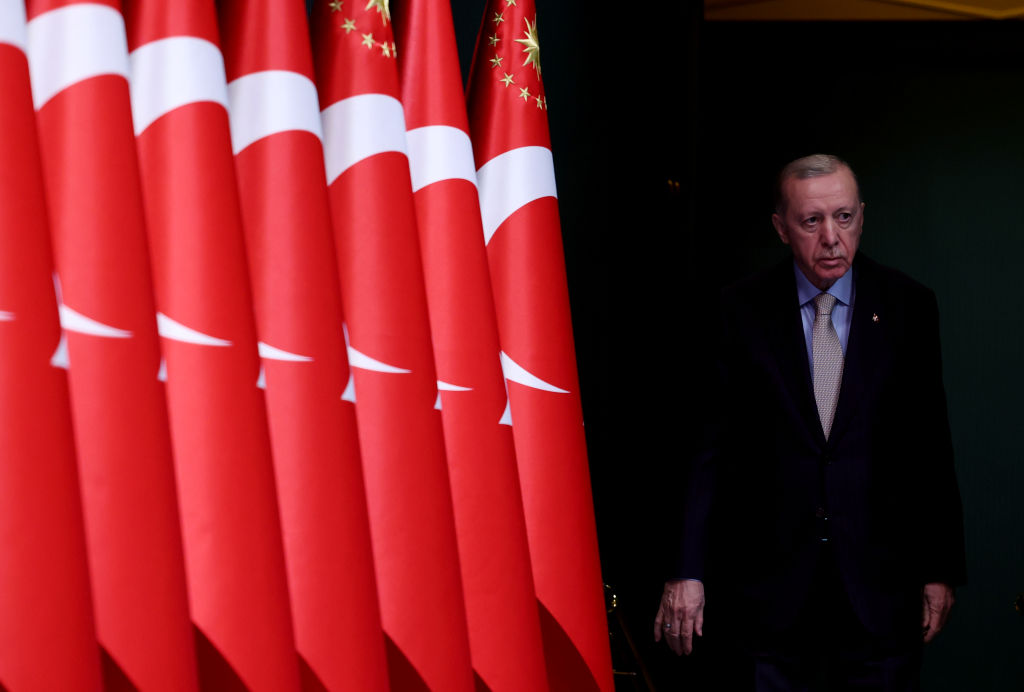








Leave a Reply